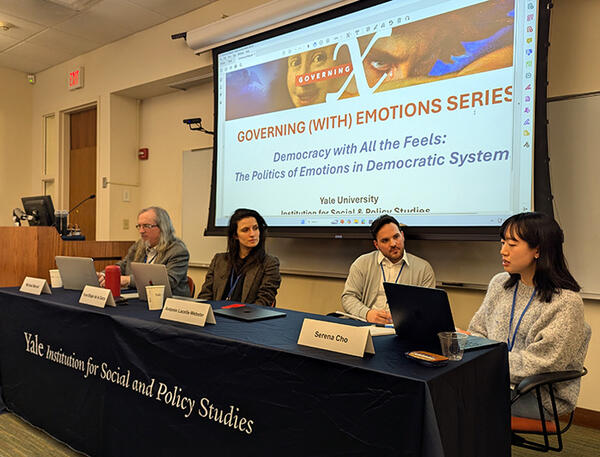Democracy With All the Feels: How Emotions Shape Politics

Emotions can run hot in politics, and that’s often viewed as a bad thing. Observers might laud a dispassionate process, a steady hand on the wheel, and an outcome in which cool reason triumphs over strong expressions of spirit.
But Hélène Landemore and postdoctoral associate Antonin Lacelle-Webster emphasize the importance of emotions in democratic systems. Their work highlights how love, empathy, and hope can play crucial roles in fostering engagement and deliberation.
Last month, Landemore and Lacelle-Webster hosted a conference at Yale’s Institution for Social and Policy Studies called “Democracy With All the Feels: The Politics of Emotions in Democratic Systems” to reflect on the conditions under which emotions can constructively contribute to democracy, especially in times of crisis and uncertainty.
“Emotions are not just personal experiences but deeply intertwined with political practices and institutions,” Landemore said. “It is vital that we design democratic interventions that are sensitive to emotions to enhance democratic participation and resilience.
Lacelle-Webster added: “Focusing on emotions in the study of democratic politics forces into view what is often implicit and brings about attention to their underlying effects on the ways we engage with others.”
The conference was the latest in Landemore’s “Governing X” series, sponsored in part by ISPS’s Democratic Innovations program. Landemore, a professor of political science, helps lead Democratic Innovations, designed to identify and test new ideas for improving the quality of democratic representation and governance.
In a panel discussion, Michael Morrell, associate professor of political science at the University of Connecticut, reviewed research showing that empathy can reduce attribution bias and negative out-group evaluations.
“Deliberative democracy relies on understanding and sharing the feelings of others to ensure equal consideration of all citizens,” he said. “Empathy must be a central component of democratic politics.”
Yuna Blajer de la Garza, an assistant professor of political science at Loyola University, argued that indifference arises not only despite some of the characteristics of successful democracies, but because of them. She said reliable institutions can lead to complacency and disengagement, while transparency can overwhelm citizens with information, leading to disillusionment and inaction.
“Gramsci wrote that indifference works powerfully in history, and I think I agree,” she said.
Molly Scudder, associate professor of political science at Purdue University, addressed how cynicism is contagious but that research indicates it can be mitigated among participants in deliberative forums.
Lacelle-Webster differentiated the individual experience of hoping alongside others and collectively hoping with others by drawing on San Francisco politician and gay rights trailblazer Harvey Milk. He discussed how political institutions and shared spaces can play a crucial role in enabling the conditions for hoping with others and sustaining democratic engagement.
“Hope can sustain moments of political transformation,” Lacelle-Webster said. “And so we must distinguish how it is experienced, because what leads us to act — or not act — is constantly changing.”
Steven Webster, associate professor of political science at Indiana University, covered how anger predicts joy in the suffering of others — known as schadenfreude — and the dehumanization of political opponents.
“Anger is rampant in American politics,” Webster said. “And anger and schadenfreude are linked to attitudes and preferences for policies that harm American democracy.”
Katie Stockdale, associate professor of philosophy at the University of Victoria, introduced the concept of “fearful hope” in which hope is tainted by fear and less effective in motivating action. She cited the impact of extreme weather events on people’s hopes and fears and their ability to successfully confront global climate change.
“Hope can lose credibility in a climate of fear,” she said.
Lala Muradova, a lecturer in politics and international relations at the University of Southampton, presented an experiment on the interactions between despair and hopeful empathy on pro-climate policies.
Meena Krishnamurthy, associate professor of philosophy at Queen’s University, recovered the creative and potentially constructive dimensions of disappointment on political action by drawing on the work of Martin Luther King Jr.
Michael Neblo, professor of political science and director of the Institute for Democratic Engagement and Accountability (IDEA) at Ohio State University, presented with undergraduate student Natalie Miller. They talked about how artificial intelligence interventions have shown promise in reducing ad hominem biases in online interactions, facilitating empathy by promoting emotional awareness and perspective-taking.
Karen Celis, professor of political science at Vrije Universiteit Brussel, summarized research showing that emotion-sensitive interventions can enhance democratic participation and resilience.
Jennifer Forestal, assistant professor of political science at Loyola University, discussed how resentment is linked to feelings of powerlessness that can be mobilized through social media.
And Landemore closed the conversations with an overview of her observations of how love and strong emotional bonds can emerge in deliberative settings.
“Love is not necessarily a mere side effect of our democratic participation,” Landemore said. “Love acts as a precondition for effective deliberation.”
Thalsa-Thiziri Mekaouche, Yale College ‘26, contributed to this report.